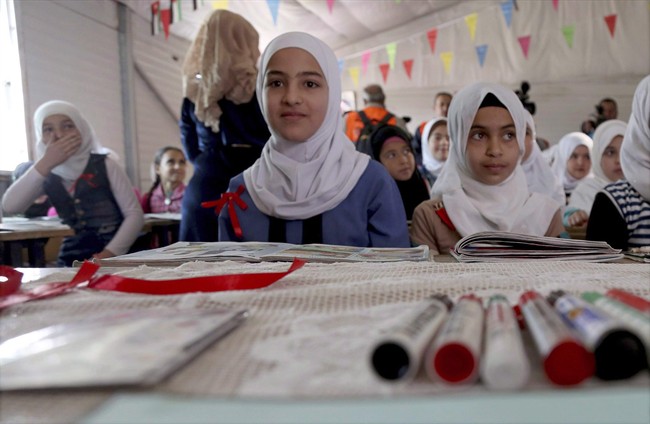Despite pledges made at a conference in London 18 months ago, a UNICEF report states that 534,000 Syrian refugee children in Turkey, Lebanon, Jordan, Iraq and Egypt, and a total of 2.3 million Syrian children around the world that are not enrolled in any formal education.

World leaders at London’s “Supporting Syria” conference in February 2016, set a goal of having all school-aged Syrian refugee kids enrolled in formal education by the end of the 2017 school year. Because they neighbour Syria, these five countries have received the highest volume of Syrian refugees, with Lebanon topping the list at 844,021.
In addition, the report states that over two million Syrian children around the world are not in school, and even more are at risk of dropping out entirely.
WATCH: Syrian refugee one of Manitoba’s top wrestlers at Canada Summer Games

“Donors and host countries have promised that Syrian children will not become a lost generation, and yet six years into the crisis, that is exactly what is happening,” Bill Van Esveld, senior children’s rights researcher at Human Rights Watch said in a statement about the pledge’s progress.
The conference also launched a UN-led $8-billion education aid appeal for 2017, which allotted $3.4 billion for Syria and $4.6 billion for the host countries, that was only 25 per cent funded by July 2017, according to UN figures.
WATCH: 2nd year of Edmonton summer camp welcomes returning Syrian kids

“The governments involved urgently need to fix what’s not working and to do that they need better information on how many children are in school and on how funding is being delivered,” Van Esveld continued.
At the time of the conference, it was estimated that 715,000 Syrian children remained out of school in these nations.
York University professor Ranu Basu who works with the university’s Centre for Refugee Studies, explains that educating refugees in times of mass migration has always posed a challenge.
WATCH: Red tape blamed for delaying arrival of Syrian refugees

“This is something that has been an age-old problem. What the challenge is, particularly in the last few years, is the scale.”
She goes on to say that these nations, already face high rates of poverty among their own populations, are “hosting most of these refugees in really, really difficult situations.”
Some reasons for this persistent issue includes a lack of national resources as well as many children getting jobs immediately to help support their families.
WATCH: Young Syrian refugees get warm welcome from White Rock elementary students

“There’s the question of livelihood, it’s all about livelihood. Questions of citizenship are also crucial in this case,” Basu said.
Canada hasn’t been spared from the challenges of educating Syrian refugees, even on a smaller scale. While it is illegal in Canada for children not to be in school, Basu explained that teachers and educators often have trouble keeping them in class, for similar reasons.
Even when students are attending class, several issues remain.
Overcrowding has proved overwhelming for many Canadian schools, with examples from Halifax and Regina. Ahead of the 2016/2017 school year, reports cited some regions preparing to accept thousands of new students ahead of the 2016/2017 academic year.
In addition, Basu explained that undocumented immigrants in Canada cannot apply to universities as domestic applicants and need to pay international fees.
Canada has been called on by non-profits like CIGI to contribute to the effort to educate Syrian refugee children both domestically and around the world, and just a few years ago donated $103 million to child-education projects abroad including help for displaced Syrian children.
Basu believes however, Canada could be doing more.
“Canada can have a larger voice in the conflict and peace negotiations. These conversations really need to happen.”




Comments